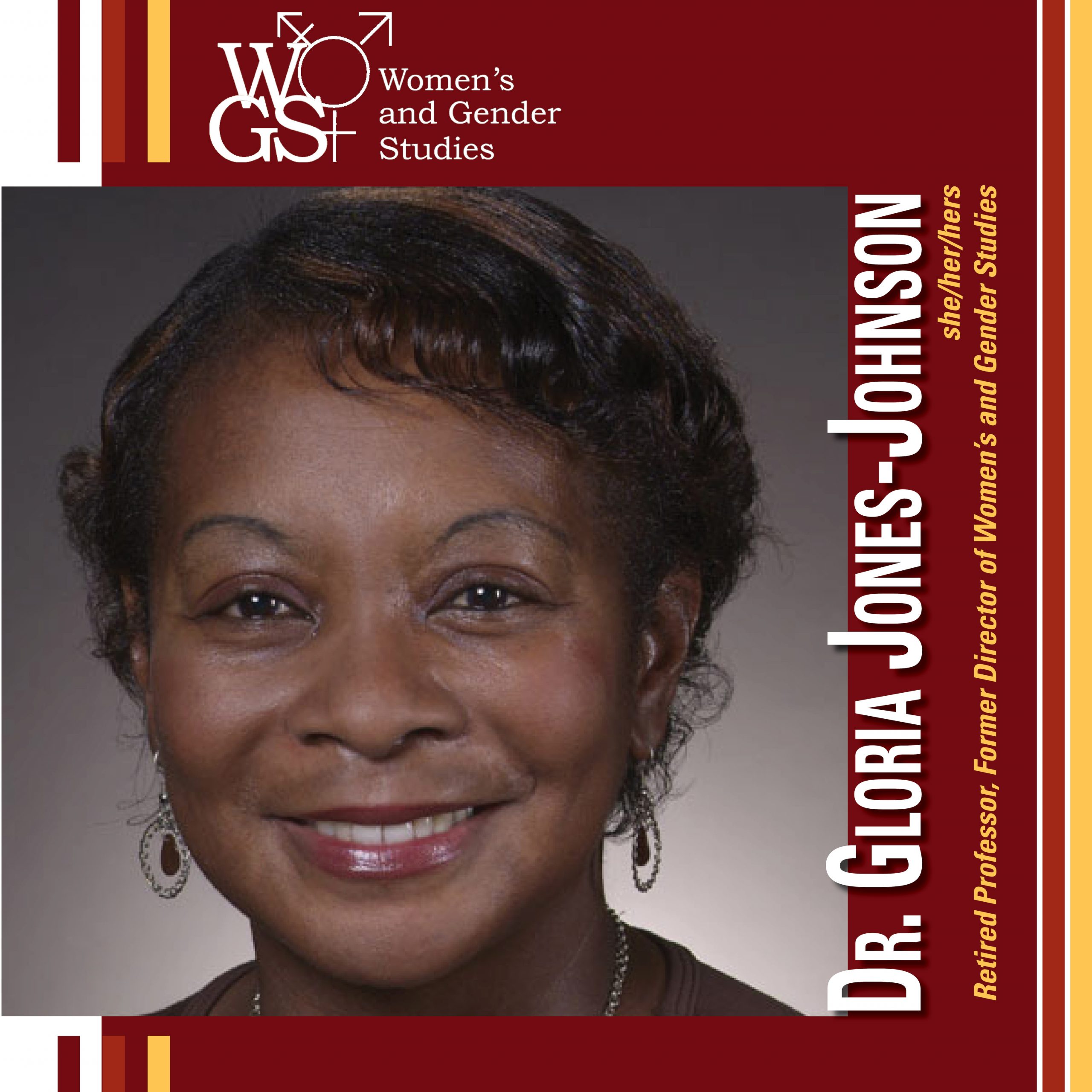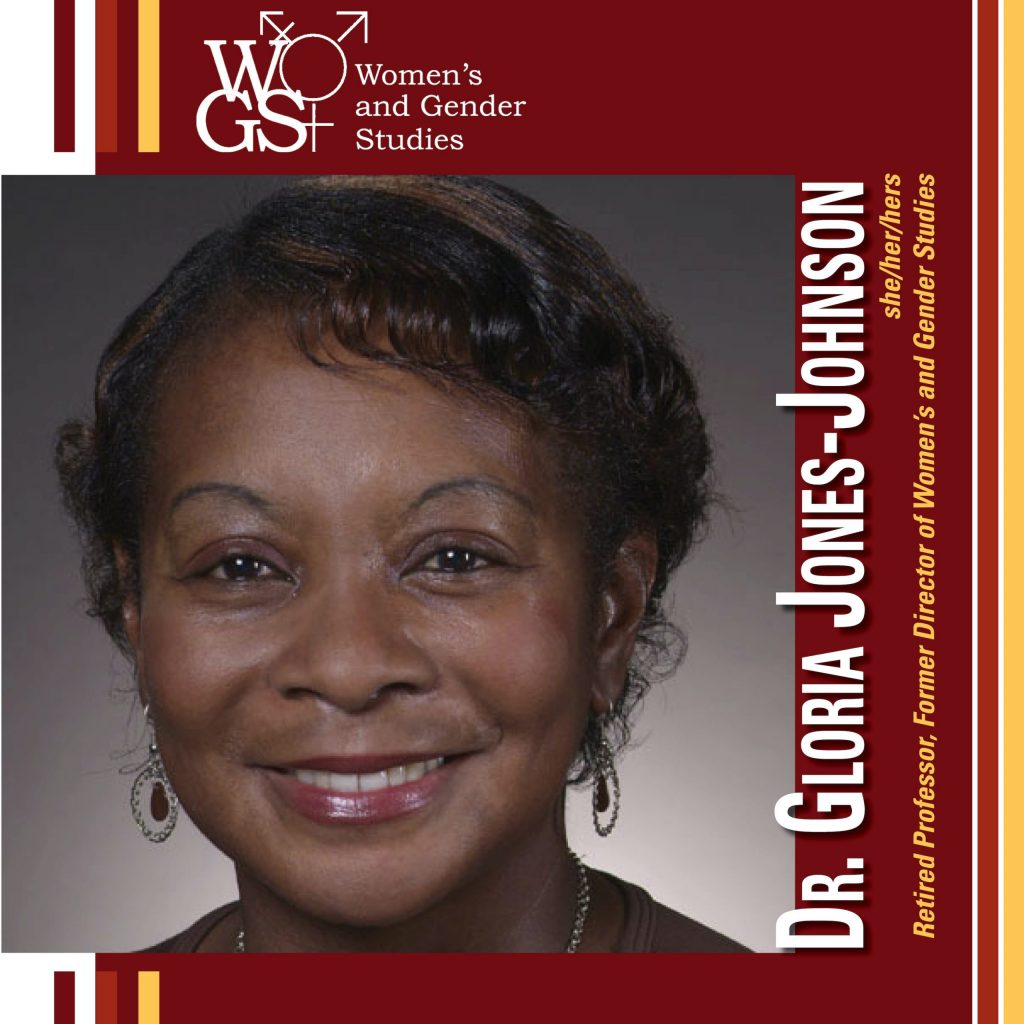Former WGS Director Dr. Gloria Jones-Johnson Retires
Author: annober

Author: annober

 Dr. Gloria Jones-Johnson’s career in the Sociology Department at Iowa State University began in 1986. She also served as Director of the Women’s and Gender Studies Program from 2010-2015 and is the only African-American woman to serve in this position since its inception. During her tenure, Dr. Jones-Johnson coordinated many significant changes and improvements to the program. We sat down with Dr. Jones-Johnson to share her highlights as Director and as a faculty member at ISU.
Dr. Gloria Jones-Johnson’s career in the Sociology Department at Iowa State University began in 1986. She also served as Director of the Women’s and Gender Studies Program from 2010-2015 and is the only African-American woman to serve in this position since its inception. During her tenure, Dr. Jones-Johnson coordinated many significant changes and improvements to the program. We sat down with Dr. Jones-Johnson to share her highlights as Director and as a faculty member at ISU.
Tell us about becoming the Director of Women’s Studies. When did that happen, how long were you the director, and why did you value the position?
I was the director from 2010-2015, so five years. I was serving on the Women’s Studies steering committee before I became the director, so I was familiar with the program. Dawn Bratsch-Prince was the interim director, so I replaced Dawn. At that point, Dean Mike Whiteford was the Dean of the College of LAS and hired me. [WGS had] started to experience funding issues. But when I became director, I got a lot of support from the administration. Mike Whiteford gave me a lot of support; Arne Hallam, too. Paul Lasley (Chair of Sociology) was very supportive as well.
What were some of your highlights of directing the program. What lessons did you learn along the way?
There was a flurry of activities and concerns about exactly what was Women’s Studies versus gender and sexuality—the tension between those three were at a breaking point. There was a push to get a sexuality certificate. During my time here, Women’s Studies had pivoted back and forth between English and Sociology.
I hired Michèle Schaal as my first tenure track hire, and Mike Goebel was my first lecturer hire. There was quite a bit of negotiation, especially for a tenure track position. So, the provost supported the tenure track hire of Michèle Schaal. But after that we could only hire lecturers. I was lucky to have some really, really good graduate students. The interdisciplinary nature of the program was one of the things that I really enjoyed. I recruited a lot of really good students from [the School of] Education. They were pretty active with working with the Tri Iota program and mentoring and interacting with undergraduates.
There was a lot of support, but it was a fight all the time. I had a few challenges, because I told them at the point of hire that I wanted to change the program from Women’s Studies to Women’s and Gender Studies. That was part of my agreement to direct the program, because a lot of the problems were that Women’s Studies was becoming isolated and characterized as “angry feminists.” The problem with women were not the women–it was the relationship between men and women. “Could men be feminists?” I felt we had to bridge that and bring men in. I was kind of amazed at the challenge it was to get the name changed.
Student involvement was one of the most gratifying things about directing the program. We reinvigorated Tri Iota, the honors program, which was a big plus for the program. We really pushed and advertised for the scholarship programs and increasing the visibility of the graduate student minor. When I started, there were very, very few of them.
I was lucky, I was able to keep most of the funds for our summer online sections, and I used that to fund small grants for our faculty affiliates. They had to present at our brown bag lunches. We had widespread participation across campus–people would email and ask me if they could be faculty affiliates. We had an Advisory board–people from the community, from different colleges. Someone from Business, Engineering, Vet Med; somebody from the high school, even. We met once a semester. But we got a lot of good feedback from that group. It was very valuable, and I made sure that our meetings and stuff got published so the Dean could see that we were everywhere. It also contributed to people wanting to fund the program.
It was a really wonderful–we had a lot of support. It was a really vibrant time!
What were some highlights of teaching WGS and related Sociology courses? What does feminism/women’s and gender studies pedagogy look like to you? How did you implement that in the classroom?
I taught “Intersections of Race, Class, and Gender,” which was by far my most awesome, best class I taught. It was a mix of grad and undergrad students. The embracing of the topic, seriousness of the discussion, the thirst for wanting to know more about intersectionality–that was really exciting. I also taught a cross-listed course with African American Studies: “Women of Color.” I kind of “rebirthed” it. I also taught WGS 201 in the summer–I felt that I had to keep a pulse on what was happening in that course. I really valued doing that.
I got some grants from the provost’s office to sponsor mini conferences. Students would have their final papers, and I would invite people from Drake and community colleges to come in, so students could present their papers and get feedback. I had a lot of support from the Provost’s and Dean’s offices. The students really, really loved that. It was really wonderful. I got support to take students to conferences–some grad and even a few undergrads. We loved going to conferences, we funded students to go to NWSA so they could attend. That was really a lot of fun!
Christiana Langenberg was a co-advisor with WGS and English. She taught Write Like a Woman and created our Learning Community. The Write Like a Woman class did a Brown Bag Lunch every semester to show what they had created in their final. It was always really exciting to see what they created.
One of the things I prided myself on was the reflection component of teaching. I took that from my Women’s Studies classes and took that to my Sociology classes. I also created a style with students where they had to send me one or two things they learned from the readings before the class started, and I would start with what they had to say and integrate that into the lecture. It gave them ownership of the lessons.
It was important to me to balance academic rigor with relevance, activism, and experiential learning. I’m flexible, but Women’s and Gender Studies and Sociology have to be considered a science in scholarship. It’s important. I remember when I first taught the Women of Color class, the biggest complaint was “I thought this was going to be an easy class!” Well, it’s as easy as you’re going to make it. You’re going to read. I will be flexible, I will consider your learning styles–especially with undergrads, giving them alternative ways of learning. If you wanted to do a scrapbook, as long as it included scholarship and academic rigor, I’m open, but you have to show me what you’ve done.
One of the things I see as a challenge for Women’s and Gender Studies… at some point, I don’t know if “Sexuality” will be added to the program. What is that? Is it a coexistence? A tension? A complement? I see that as the next layer that the pedagogy has to address. Particularly the increasing visibility of the transgender and nonbinary folks–Elliott Page just came out. Those issues are becoming really important for Women’s Studies to address in a pedagogical way. I taught a grad course, and put a whole section of trans and gender binary literature that’s out there. Students could select topics to present, but nobody would touch that topic. Well, that’s too bad, I’m going to present it to you! So, we had gender nonbinary readings, asexuality, and trans components. How that’s creating discourse and tension in the LGBT-community. People have to acknowledge and give proper respect, use the proper nomenclature or pronouns.
What will you miss about teaching and being a faculty member at Iowa State?
I love graduate teaching. I’m really going to miss that, and graduate mentorship. Serving on POS committees and prelims and that kind of thing. And mentoring junior faculty–that part of the role I will really miss quite a bit. The dynamic interaction, the ability to challenge them and to have a high level of discourse. They always complained I gave them too many readings, but just pushing them. Saying, “I realize this is too much, but if I don’t challenge you, you won’t rise to where you should be.” Over time, they got it!
Teaching virtually has its challenges, and I was just getting the hang of it… then, you know [referencing the COVID-19 pandemic]. There you go! I really wanted to get a chance to get back to interacting face-to-face.
What’s next for you?
I hadn’t planned to retire until two years in the future, but they came up with a program to retire early [due to the pandemic]. I decided that this was a good time, because I didn’t want to go back into the classroom yet due to health reasons. My grad class was listed face-to-face for spring, and worrying about getting that rearranged, the stress of that, it made it a good time for me to exit and move on. I have a lot of projects that I’m trying to finish: the microaggressions in engineering project is phasing out. I’m trying to still say no to [new] projects. I want to do more social activism with the LGBT community, for their legal and healthcare rights. I want to be more active in that role. I’ve been asked to write a memoir, a reflection of my 34 years at Iowa State, too. But for the immediate future, it will be resting. Getting up when I want to! And enriching my relationships with siblings. Taking care of my health, learning to cook exotic things.
I’ll be around! I like Iowa–except for the winters! I’ve become an Iowan and didn’t realize it. So we will be here, and just try to get away December, January, February. So I’m gonna stay active here on campus. Invite me to things, and I’ll come!
Congratulations to Dr. Gloria Jones-Johnson on a successful career and a lasting legacy on the Women’s and Gender Studies Program at Iowa State University.